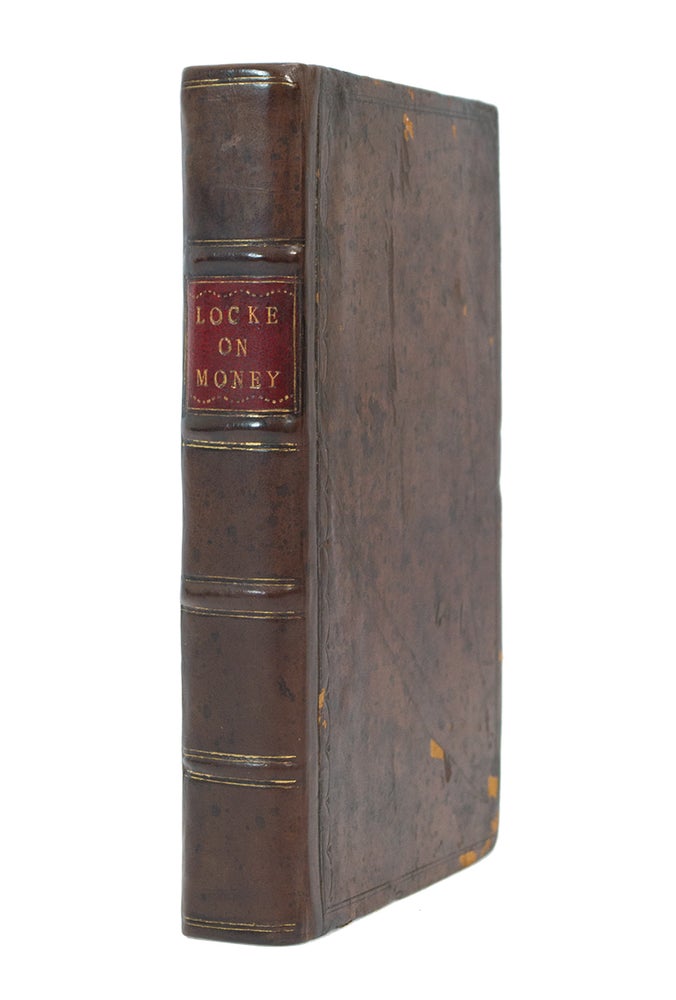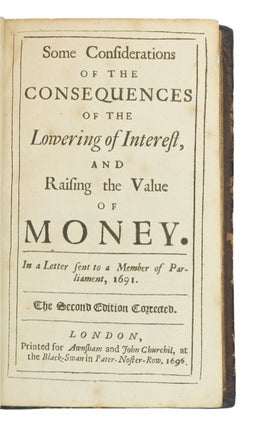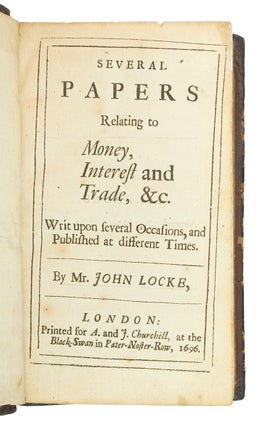First Collected Edition of Locke's Writings on the Fundamentals of Economics
Several Papers Relating to Money, Interest and Trade, &c. Writ upon several Occasions, and Published at different Times.
London: Printed for A. and J. Churchill, 1696.
First collected edition of Locke's important writings on the fundamentals of economics. Small octavo (6 5/16 x 3 3/4 inches; 159 x 95 mm). [4], 4, 192; 24; [16], 111, [1, advertisement], [1, eratta], [1, blank] pp. With general title-page, and separate title-pages for Some Considerations and Further Considerations.
Contemporary full speckled calf, rebacked to style. Boards stamped in blind. Red morocco spine label, lettered in gilt. Boards a bit chipped and bumped. Overall a very good copy.
Comprised of:
The Second edition Corrected of:
Some Considerations of the Consequences of the Lowering of Interest, and Raising the Value of Money. In a Letter to a Member of Parliament, 1691. London: for Awnsham and John Churchill, 1696.
[and]
Short Observations on a Printed Paper, Intituled, For encouraging the Coining Silver Money in England, and after for keeping it here. [1695]
[and]
Further Considerations Concerning Raising the Value of Money. Wherein Mr. Lowndes’s Arguments for it in his late Report concerning An Essay for the Amendment of the Silver Coins, are particularly Examined. London: Printed for A. and J. Churchil, 1695.
ESTC lists two variants: one has "By John Locke, Esq;" on the title-page, 'Further Considerations' dated 1695, and 111 pages. The other issue has "By Mr. John Locke" on the title-page, "Further Considerations" dated 1696, and 112 pages. This copy is a combination of the two, with 'Further Considerations' dated 1695 and "By Mr. John Locke" on the title-page.
“‘The Great Recoinage’ controversy of the 1690s was the impetus for Locke’s writings on mercantile and monetary theory. In the 1660s Sir Josiah Child had argued that the legal rate of interest should be lowered. It was still a topic for political discussion in the early 1690s: Child was still pressing the argument, and was supported by London merchants. Locke however defended a legal rate of interest but refused to fix it below the current rates. This was the occasion for his publishing Some Considerations of the Consequences of the Lowering of Interest and Raising the Value of Money in 1692. When William Lowndes, Secretary of the Treasury, proposed in 1695 to raise the nominal value of coins, Locke slightly revised Some Considerations and also published two further pamphlets, Short Considerations, and Further Considerations. At that time gold and silver coins had a value equivalent to their metal content, representing nothing but their silver or gold quantity. Locke rejected devaluation, basing his argument on this ‘commodity theory’ of money. He considered ‘raising of the denomination or the increase of alloy’ to be debasement and fraud” (Yolton).
“Locke’s second major essay, Further Considerations Concerning Raising the Value of Money (1695), while it reiterated many of his earlier arguments, was mostly concerned with the issue of recoinage. Locke took issue with a proposal to devalue the official coinage by 20 per cent and argued strongly for recoining at the old standard the currently circulating coins debased by clipping and normal wear and tear. Money, Locke argued was equivalent to gold and silver. People contracted for gold and silver and a government stamp was simply an assurance of the specie content of official coins. Hence, a devaluation would only confuse trade and cause an increase in prices denominated in terms of pounds and shillings” (The New Palgrave).
Einaudi. Goldsmiths'. Kress.
HBS 66981.
$11,000.
Price: $11,000.00
Item #66981



